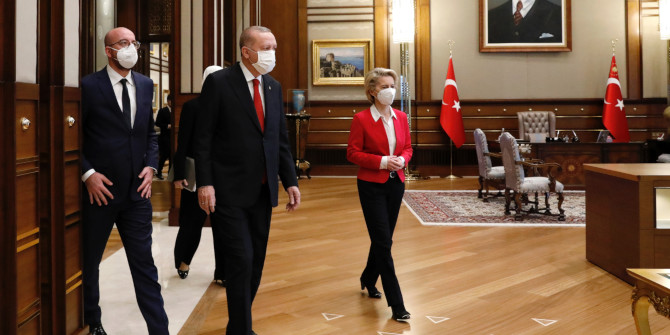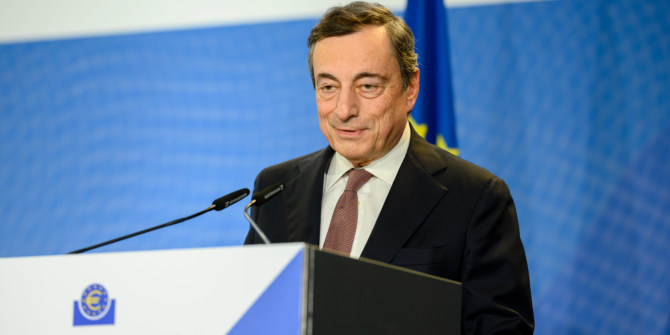 Poland held local elections between 16 and 30 November, with the results being seen as a key indicator of support ahead of the country’s 2015 parliamentary election. Aleks Szczerbiak writes that while at first glance the results of the elections showed the two main parties – Law and Justice, and Civic Platform – running neck and neck; a strong performance by the junior governing party, the Polish Peasant Party (PSL), initially suggested that the most likely outcome in 2015 will be a continuation of the current coalition. However, the key story to emerge from the elections was controversy over whether the results might be unreliable, given major discrepancies with the exit poll findings and large numbers of invalid ballot papers.
Poland held local elections between 16 and 30 November, with the results being seen as a key indicator of support ahead of the country’s 2015 parliamentary election. Aleks Szczerbiak writes that while at first glance the results of the elections showed the two main parties – Law and Justice, and Civic Platform – running neck and neck; a strong performance by the junior governing party, the Polish Peasant Party (PSL), initially suggested that the most likely outcome in 2015 will be a continuation of the current coalition. However, the key story to emerge from the elections was controversy over whether the results might be unreliable, given major discrepancies with the exit poll findings and large numbers of invalid ballot papers.
The local elections, held on 16 November with a second round run-off two weeks later where a mayoral candidate failed to secure 50 per cent, were set to be a major test of popularity for the main parties a year ahead of next autumn’s parliamentary election. Together with the summer presidential poll, this will determine the future shape of the Polish political scene for several years.
They were also the first electoral outing for Ewa Kopacz since she took over as prime minister and leader of the centrist Civic Platform (PO), the main governing party, after her predecessor Donald Tusk was appointed as the new President of the European Council. Some 47,000 councillors were elected to three tiers of local government together with 2,500 directly elected mayors. However, the best indicator of party support was the vote for Poland’s 16 regional assemblies, which are fought on national party lines. So what conclusions can we draw from these elections about the current state of Polish politics?
A symbolic victory for Law and Justice
First, the elections constituted the first national contest since 2005 in which the right-wing Law and Justice (PiS) party – the main opposition grouping led by Jarosław Kaczyński, Mr Tusk’s predecessor as Prime Minister – finished ahead of Civic Platform, albeit extremely narrowly by 26.7 per cent to 26.4 per cent. Civic Platform had beaten Mr Kaczyński’s party in the previous seven local, parliamentary, presidential and European elections, so this was an important symbolic victory for Law and Justice. It was also achieved in spite of a lacklustre campaign in which the party struggled to adjust its political strategy to the new political situation that arose following Mr Tusk’s departure.
Moreover, the final week of the campaign was dominated by the so-called ‘Madrid affair’ which followed allegations that three Law and Justice deputies, including its national spokesman Adam Hofman, had made fraudulent expense claims by stating they travelled by car to an international parliamentary meeting in Madrid when they had, in fact, used a much cheaper budget airline. The allegations were especially damaging for a party that has made opposing corruption in public life one of its signature issues.
However, Law and Justice moved quickly to contain the damage by immediately expelling the three deputies and, in doing so, attempted to contrast its swift actions with the allegedly weak and indecisive way that Civic Platform had dealt with scandals involving its own parliamentarians. Mr Kaczyński’s party also tried to distract media attention from the ‘Madrid affair’ by bringing forward the announcement of Andrzej Duda, a respected Law and Justice MEP, as its presidential candidate.
Is there a ‘Kopacz effect’?
At the same time, the local election results were a disappointment for Civic Platform, given that opinion surveys conducted in the run up to the poll had shown the party enjoying a narrow lead. Although Mrs Kopacz lacks her predecessor’s gravitas and charisma, Civic Platform strategists tried to take advantage of Mr Tusk’s departure by re-launching the government on the basis that she represented a change of leadership style. Making a virtue of her roots as a family doctor from the provinces, she contrasted her background and experiences with those of Warsaw politicians who, she implied, were detached from the day-to-day realities faced by ordinary Poles. Indeed, in an almost apolitical appeal, Mrs Kopacz claimed that she offered pragmatism, consensus and practical solutions to people’s everyday problems in place of ideological divisions.
However, the local election results suggested that the so-called ‘Kopacz effect’ was not as significant as Civic Platform strategists had hoped. Although voters appear to have warmed to her personally – a November tracking poll by the CBOS agency found that she enjoyed an approval rating of 62 per cent, the second highest of any Polish politician – this did not necessarily translate into electoral support for Civic Platform. Moreover, her policy of downplaying partisanship may have disorientated the party’s more passive supporters. Mr Tusk mobilised the Civic Platform base by constantly attacking Law and Justice for its alleged radicalism and arguing that Mr Kaczyński’s return to office would lead to political turmoil.

Nevertheless, up until now none of Civic Platform’s various factions have questioned Mrs Kopacz’s leadership. Moreover, although the party’s disappointing result will have emboldened her rivals, notably foreign minister and former deputy leader Grzegorz Schetyna, it is extremely unlikely that she will face a leadership challenge before the parliamentary election.
Indeed, although the results fell below expectations, Civic Platform drew comfort from only experiencing a narrow defeat in the regional poll in spite of the fact that, after seven years in office, the party had been severely weakened by a series of political crises and scandals; indeed, at one point last summer Civic Platform was more than 10 per cent behind Law and Justice in the polls. Moreover, across the country Mrs Kopacz’s party actually won the largest number of regional seats, 179 to Law and Justice’s 171, and, given Mr Kaczyński’s party’s lack of coalition potential, retained control of 15 out of the 16 assemblies.
The Peasant Party’s (apparently) stunning success
An important reason for this was the extremely strong showing of the agrarian Polish Peasant Party (PSL), Civic Platform’s coalition partner, which achieved its best result in any post-1989 election, finishing third with 23.7 per cent of the regional assembly vote. The party always performs better in local elections: it also came third in the previous 2010 regional poll with 16.3 per cent of the vote, but only obtained 8.4 per cent in the subsequent 2011 parliamentary election. This is partly due to its strong grassroots organisational base but also because in local polls there is a higher turnout in rural areas that form the bedrock of the party’s support.
Nonetheless, the Peasant Party’s stunning performance exceeded its wildest expectations, not least because it had found itself on the back-foot during the campaign after party-nominated agriculture minister Marek Sawicki called Polish farmers affected by Russian sanctions, who chose to sell apples at a lower price rather than withdraw them from the market and seek compensation, ‘suckers’. In fact, some commentators suggested that the Peasant Party may have benefited from distancing itself from the other main parties’ strong support for EU sanctions against Russia, which are very unpopular in rural areas. The local election results will have greatly strengthened both the party’s position within the government and the personal standing of its leader, Deputy Prime Minister Janusz Piechociński, who had been criticised for apparently allowing Civic Platform to marginalise its junior coalition partner.
On the other hand, the local election results were a disaster for the communist successor Democratic Left Alliance (SLD), the smaller left-wing opposition party led by former Prime Minister Leszek Miller. While the party had been hoping to emerge as ‘king maker’ in a number of regions, as a precursor to a possible coalition with Civic Platform after the next parliamentary election, it actually saw its vote share in the regional assemblies fall from 15.2 per cent to only 8.8 per cent, with its number of seats slashed from 85 to 28.
Were the results reliable?
However, all of this was over-shadowed by a major controversy over the reliability of the regional assembly results. First, due to computer errors it took the State Election Commission (PKW) nearly a week to publish them, casting doubt on the competence of the electoral process. Then, when the results did finally emerge, there were major discrepancies with the exit poll conducted by the Ipsos agency. The latter gave Law and Justice 31.5 per cent, Civic Platform 27.3 per cent and the Peasant Party 17 per cent, thereby over-estimating Mr Kaczyński’s party’s share by nearly 5 per cent and under-estimating Mr Piechociński’s party by almost 7 per cent.
This was the largest discrepancy ever recorded in a post-1989 Polish election exit poll and came in spite of the fact that such surveys have become increasingly accurate in recent years; indeed, the same poll correctly predicted mayoral results in the large provincial towns. There was also no indication of this kind of surge of support in pre-election polls which showed the Peasant Party on around 5-10 per cent.
At the same time, 17.9 per cent of the votes cast in the regional poll were declared invalid, a record for a Polish election (in previous regional elections the numbers ranged between 12.1 per cent and 14.4 per cent) compared with an average of 9.8 per cent across all three tiers and only 2 per cent in the mayoral elections. Some commentators claimed that the large number of invalid votes helped to explain the discrepancy between the exit poll prediction and the actual results. They argued that the reason for this might have been because some voters were confused by the ballot paper for the regional polls – which took the form of a booklet containing one page for each party’s candidates rather than a single sheet (as was the case in previous local elections) – and may have thought that they had to pick one candidate from each party list. Unfortunately, the State Electoral Commission was not required to record whether invalid votes in regional polls were incomplete or spoilt.
At the same time, the Peasant Party may have benefited from the fact that its candidates were listed on the front page. However, the same system was used in the May European Parliament (EP) election, where there was no significant increase in invalid votes and no premium for the party which appeared on the first page (although, it was argued, the instructions were clearer in the EP poll). Moreover, if the exit poll was accurate then a disproportionately large number of Law and Justice voters must have failed to complete their ballot papers properly.
Controversy over the election results led to an unprecedented meeting of minds between Law and Justice and the Democratic Left Alliance who, in spite of being bitter political rivals, both questioned their accuracy. In fact, Mr Kaczyński went as far as to say that the regional results were ‘falsified’ and that not only would his party challenge them in court but it would also stage a national protest march on 13 December, the anniversary of the declaration of martial law by the communist regime in 1981. Law and Justice traditionally leads a march on this date, but this year it will provide a focus for all those who are dissatisfied with the election results. An IBRiS poll for the Rzeczpospolita newspaper found that 29 per cent of respondents felt that the elections were not conducted fairly, while 59 per cent said that they were.
A constitutional crisis?
Even if one assumes that the regional election results were accurate, the Peasant Party is unlikely to repeat its stunning performance in next year’s parliamentary poll. Nonetheless, these elections highlighted the fact that, given its apparent lack of coalition potential, Law and Justice could emerge as the largest party in the parliamentary ballot but still end up in opposition if it fails to secure an outright majority.
However, controversy over the reliability of the electoral process limits the extent to which one can draw firm conclusions about the true levels of party support. It also raises fundamental questions over the operation of one of the key procedures that lie at the heart of any democracy: free and fair elections. Disputes over such basic democratic processes mean that Polish politics could now enter an extremely turbulent period. Indeed, if the outcome of the next parliamentary election arouses the same kind of controversy, the country will face a major constitutional crisis.
Please read our comments policy before commenting.
Note: A version of this article originally appeared at Aleks Szczerbiak’s personal research blog. The article gives the views of the author, and not the position of EUROPP – European Politics and Policy, nor of the London School of Economics.
Shortened URL for this post: http://bit.ly/1zgfQXs
_________________________________
 Aleks Szczerbiak – University of Sussex
Aleks Szczerbiak – University of Sussex
Aleks Szczerbiak is Professor of Politics and Contemporary European Studies at the University of Sussex. He is author of Poland Within the European Union? New Awkward Partner or New Heart of Europe? (Routledge, 2012) and blogs regularly about developments on the Polish political scene at http://polishpoliticsblog.wordpress.com/





